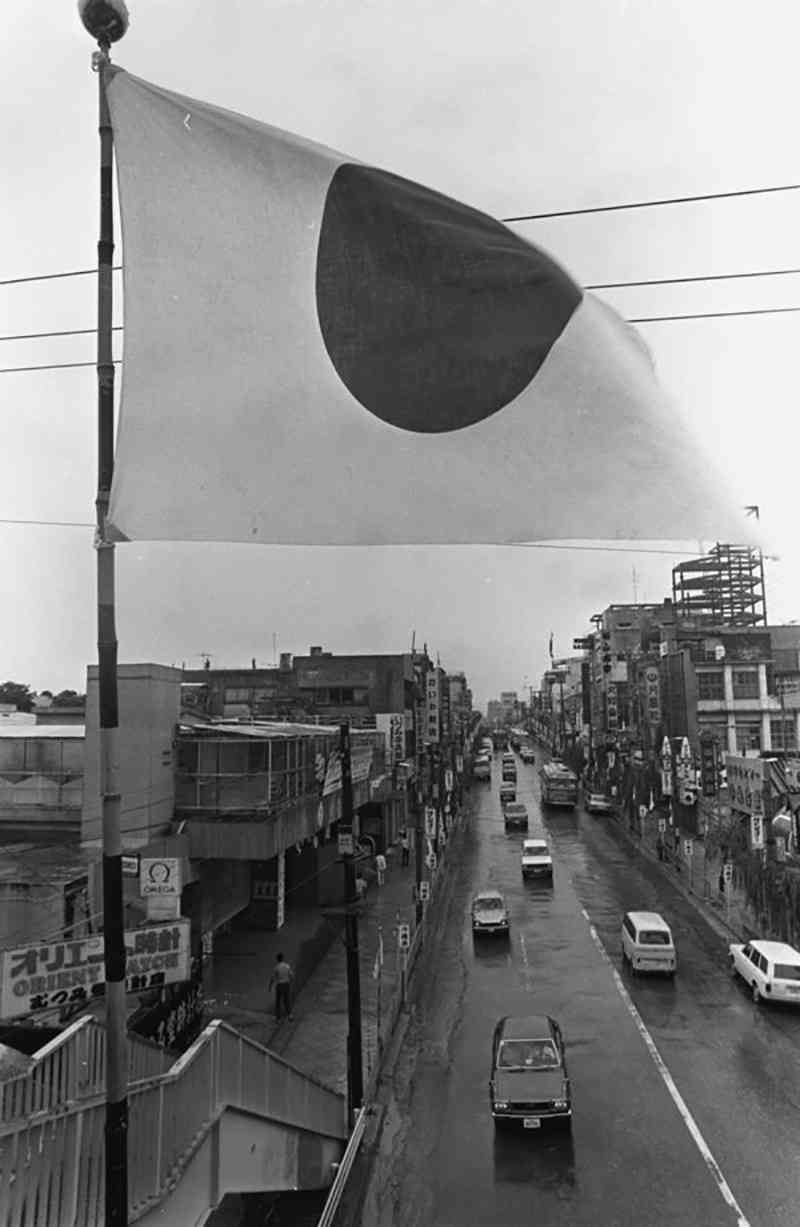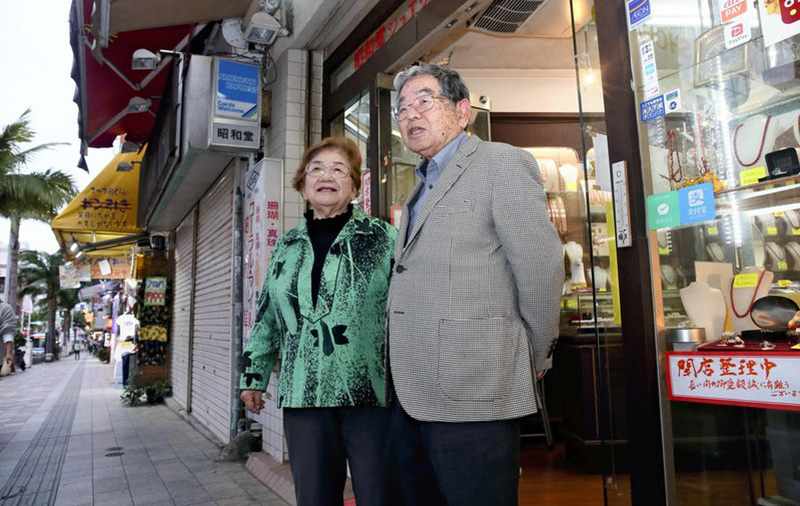
A Japanese flag is flown on a pedestrian bridge on Kokusai-dori street in Naha on May 15, 1972, the day Okinawa Prefecture reverted to Japan.
The Yomiuri Shimbun
12:14 JST, January 24, 2022
This year, Okinawa marks the 50th anniversary of its return to Japan. This is the first installment of a series that explores some of the issues that have affected Okinawa people since the handover, leading up to the present day.
Okinawa’s history of hardship and reconstruction overlaps with the lives of married couple Hiroyuki and Takako Shiroma, who ran a jewelry store on Kokusai-dori street in Naha for more than 50 years.
Hiroyuki, 87, and Takako, 83, both grew up in the village of Nakijin in the northern part of Okinawa Island. Their lives drastically changed when the U.S. military arrived in April 1945.
When Hiroyuki and his family returned to their farm from a U.S. military camp after World War II, they found their fields had been dug up and used as a rotary for military vehicles.
Hiroyuki’s father cultivated tomatoes and watermelons on wasteland, selling his produce to the U.S. military to support his family, while Takako’s mother supported her family alone, working as a day laborer on a farm.
Hiroyuki moved to Naha when he was 18 years old.
Although he had been offered a job at a pharmacy, he was attracted by a job offer from the U.S. military that offered four times the salary.
According to Hiroyuki, it was dangerous work that involved making sure bombs were stored safely at the base. After working there for several years, he moved to a trading company and in 1965 married Takako, who worked for one of the firm’s business partners.
That year, Eisaku Sato, the first postwar prime minister to visit Okinawa, delivered a speech at Naha Airport, where the Japanese flag and the Stars and Stripes were flying. “Unless Okinawa returns to its homeland, our postwar period will not end,” Sato said.
Hearing the speech made Takako feel that Okinawa had not been forgotten. She said she became aware of the disparity that existed between Okinawa and the main islands of Japan when she was a junior high school student, because she would receive leather shoes and clothes from her sister, who was eight years older and working in Osaka.
Okinawa was returned to Japanese control on May 15, 1972, 20 years after the restoration of Japan’s sovereignty. In Okinawa, where poverty and oppression had been rife, the couple paved a life for themselves on Kokusai-dori street.

Hiroyuki and Takako Shiroma stand in front of their jewelry store in Naha on Jan. 5.
Symbol of development
Kokusai-dori symbolizes Naha’s reconstruction from the devastation caused during the Battle of Okinawa. Movie theaters and clothing stores opened along the street, which had originally been a base for potters making tableware and other daily necessities. According to local lore, Americans who saw the remarkable development of the area dubbed the street “miracle mile,” and the name has stuck.
Under U.S. rule, tariffs on imported goods were low in Okinawa, which attracted tourists from other part of Japan, and the couple’s business, which opened in 1968, also took off. “Watches and Western liquor sold like hotcakes,” Takako said.
The area became even more vibrant when passports were no longer required for Japanese visitors following the return to Japan in 1972.
In 1975, the Okinawa International Ocean Exposition was held in the prefecture and Hiroyuki remembers enthusiastically inviting acquaintances outside the prefecture and the couple took visitors to see the event several times.
Under U.S. occupation, Okinawa’s roads were slow to improve. When cars traveled along the unpaved Kokusai-dori, sand and dust would get inside the store and cover the showcases, according to Hiroyuki, who said he had to spend a lot of the day wiping dirt off shop shelves until the 1980s.
Funds for the prefecture’s development from the central government meant roads and airport facilities gradually improved and tourism started to increase. Okinawa has risen to become a resort island on par with Hawaii. In fiscal 2018, between April 2018 and March 2019, the number of tourists to Okinawa exceeded 10 million.
Kokusai, or international in Japanese, is a fitting name for a street where people from all over the world can be found.
“We’ve come a really long way from nothing,” Hiroyuki said, as he thought about the progress that the couple has achieved over the past 50 years.
Lingering hardship
Okinawa has also suffered the hardships of being an “island with U.S. military bases.”
Taxi driver Masahiro Uema, 70, was one of the first students to attend Okinawa International University, which opened in April 1972 on land adjacent to the U.S. forces’ Futenma Air Station in Ginowan.
In May 1972, Uema watched the handover ceremony on TV at his parents’ home in Nago in the prefecture.
The hope among Okinawans for “an island free of U.S. bases” did not come true. The first governor of Okinawa, Chobyo Yara, said at the time, “It’s impossible to say that our earnest wish has been fulfilled.” Uema remembers thinking that as long as there are U.S. bases in Okinawa, it is not a complete handover.
In December of that year, a 4-meter-long fuel tank fell from a U.S. military aircraft onto a construction site on the grounds of the university, and a worker was covered with fuel. Uema, who continued to live in Ginowan after graduation because there were many jobs in the area, said the incident made him realize the fear associated with living near a military base.
In 1996, Japan and the United States reached an agreement for the return of land where the Futenma Air Station is located within five to seven years, following an incident in 1995 in which three U.S. servicemen raped a schoolgirl.
Uema said he had mixed feelings when Nago, his hometown, was chosen as the location for the relocated Futenma base.
In 2004, a U.S. military helicopter crashed at the university and burst into flames. When U.S. military personnel were on the scene investigating the incident, the actions of the prefectural police were limited to restricting traffic outside the campus.
The situation frustrated Uema, who said he wondered if that was really all the police were capable of doing at such a time.
He has been driving U.S. soldiers in his taxi for about 10 years and some of them spend as much as ¥20,000 on a single ride. “This is my living,” Uema said. “That’s the reality of Okinawa.”
In February, his eighth grandchild will be born. “I hope that when these children grow up, they will be able to say that there used to be U.S. bases in Okinawa.”
New challenges
Okinawa is now facing a new challenge in the form of the COVID-19 pandemic. The fragility of Okinawa’s tourism-based industry is highlighted every time cases surge.
The coronavirus outbreak that erupted at the end of last year is believed to have originated in U.S. military bases, where Japan’s infection control measures are not applicable.
On Jan. 5, the Shiromas closed their store, which was filled with the couple’s memories, due to their old age and a resurgent pandemic. Few tourists were seen on Kokusai-dori on the day.
Most Read
Popular articles in the past 24 hours
-

Japanese Version of Shohei Ohtani's Picture Book Published
-

Milano Cortina 2026: Japan’s Speed Skater Takagi Sinks to 6...
-

Osaka: 40 Ninjas Display Shuriken Throwing Skills at Japan Champi...
-

Padres Reliever Yuki Matsui's WBC Status with Japan Is in Questio...
-

Tottori: 95-Year-Old Japanese Descendent from Philippines Visits ...
-

Hiroshima: Land Scape, Special Architecture to Offer Unique Beaut...
-

Miyazaki: Japanese Woman Walks in Footsteps of Samurai Ancestor W...
-

Japan PM Sanae Takaichi Declares ‘Responsible Diplomacy’ in Her P...
Popular articles in the past week
-

Japan PM Takaichi’s Cabinet Resigns en Masse
-

Man Infected with Measles Reportedly Dined at Restaurant in Tokyo...
-

Sanae Takaichi Elected Prime Minister of Japan; Keeps All Cabinet...
-

Japan's Govt to Submit Road Map for Growth Strategy in March, PM ...
-

Bus Carrying 40 Passengers Catches Fire on Chuo Expressway; All E...
-

Milano Cortina 2026: Figure Skaters Riku Miura, Ryuichi Kihara Pa...
-

Japan, U.S. Name 3 Inaugural Investment Projects; Reached Agreeme...
-

U.S. Firm to Build Training Hub in Fukushima N-plant for Debris R...
Popular articles in the past month
-

Japan PM Takaichi’s Cabinet Resigns en Masse
-

Japan Institute to Use Domestic Commercial Optical Lattice Clock ...
-

Israeli Ambassador to Japan Speaks about Japan’s Role in the Reco...
-

Man Infected with Measles Reportedly Dined at Restaurant in Tokyo...
-

Videos Plagiarized, Reposted with False Subtitles Claiming ‘Ryuky...
-

Man Infected with Measles May Have Come in Contact with Many Peop...
-

Prudential Life Insurance Plans to Fully Compensate for Damages C...
-

Woman with Measles Visited Hospital in Tokyo Multiple Times Befor...
Top Articles in Society
-

Man Infected with Measles Reportedly Dined at Restaurant in Tokyo Station
-

Man Infected with Measles May Have Come in Contact with Many People in Tokyo, Went to Store, Restaurant Around When Symptoms Emerged
-

Woman with Measles Visited Hospital in Tokyo Multiple Times Before Being Diagnosed with Disease
-

Australian Woman Dies After Mishap on Ski Lift in Nagano Prefecture
-

Foreign Snowboarder in Serious Condition After Hanging in Midair from Chairlift in Nagano Prefecture
JN ACCESS RANKING
-

Japan PM Takaichi’s Cabinet Resigns en Masse
-

Japan Institute to Use Domestic Commercial Optical Lattice Clock to Set Japan Standard Time
-

Israeli Ambassador to Japan Speaks about Japan’s Role in the Reconstruction of Gaza
-

Man Infected with Measles Reportedly Dined at Restaurant in Tokyo Station
-

Videos Plagiarized, Reposted with False Subtitles Claiming ‘Ryukyu Belongs to China’; Anti-China False Information Also Posted in Japan






